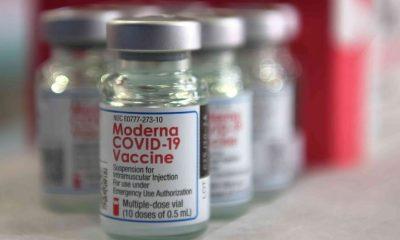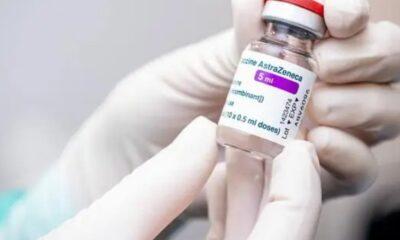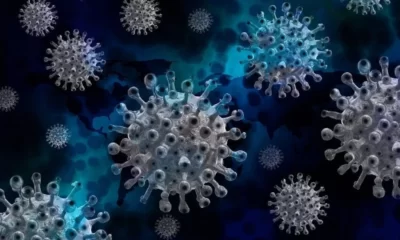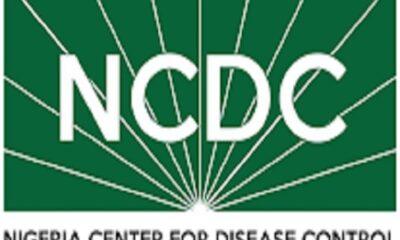Health
COVID-19: Bayelsa Converts Hospital Donated By Chevron To Isolation Centre
Published
5 years agoon
By
Editor
With a view to tackling the novel coronavirus, Bayelsa State governor, Senator Douye Diri has converted an 80-bed mother and child referral hospital built by Chevron Nigeria Limited to a temporary isolation centre in the fight against COVID-19.
Diri announced the conversion on Thursday at the official handing over of the facility sited within the premises of the Bayelsa State Medical University in Yenagoa.
The governor said that the conversion was aimed at tackling the Coronavirus pandemic threatening the lives of everyone and not an attempt to deny the people of the state of other health services.
READ ALSO: Diri Meets Buhari, Promises To Work For Peace In Bayelsa, N’Delta
He said that with initial provision of the isolation wards at the Niger Delta University Teaching Hospital to combat the virus and the new addition, the state was ready to tackle the pandemic in the event of any index case.
He urged residents to strictly comply with all protocols issued by the World Health Organisation as well as government’s directives geared toward preventing the spread of the virus into the state.
The governor also directed the Bayelsa Vigilante and the Bayelsa Volunteers to join the security operatives at the boundary points with Delta and Rivers states to reinforce the government’s lockdown directives.
READ ALSO: Olanipekun: Truth About Bayelsa Government Will Soon Be Revealed
“Yesterday in our Governors Forum meeting, we agreed to enforce and reinforce the lockdown of movement between states. Therefore, interstate movement is restricted in and out of the state.
“Nobody comes into and nobody goes out of Bayelsa for the next two weeks. I, therefore, direct security agencies to enforce this directive just as I again appeal to our citizens to obey and respect the directive.” Diri said.
Diri expressed optimism that with the cooperation of everyone, the virus had no place in Bayelsa coupled with the round-the-clock effort of the State Taskforce on COVID-19.
READ ALSO: Borno Burns, Bayelsa Boils, Buhari Dey Kampe
The governor, who expressed satisfaction with the quality of equipment in the facility donated by Chevron and its partners, said it was a worthy example of good corporate social responsibility.
Mr Mathew Sele-Epri, the Chairman KEFFES Rural Development Foundation KRDF), had earlier handed over the facility to the governor on behalf of Chevron at a brief ceremony.
KEFFES is the acronym for Koluama 1 and 2, Ezetu 1 and 2, Foropa, Fishtown, Ekeni and Sangana communities in Southern Ijaw and Brass LGAs in Bayelsa hosts to Chevron operations.
Chevron had earlier supported the eight communities with 1,600 bags of garri to cushion the effects of the lockdown imposed to check the spread of the COVID-19.
READ ALSO: Just In: Again, Nigeria Military Sets Ablaze Another Ijaw community In Bayelsa
The facility include a fully equipped delivery room, three wards and a theatre.
(NAN/NATION)
(PHOTO: File)
You may like


Brazil Star, Neymar Tests Positive For COVID-19


New Strain Of COVID Could Be Causing Strange Night-time Symptoms As Cases Spread


Why Some People Don’t Get Sick From COVID-19 Infection — Study


Japan To Treat COVID-19 As Common Flu


Concerns Rise Amid Surge Of COVID Variants Globally


JUST IN: New COVID-19 Variants Not In Nigeria – NCDC
Health
LASG FLags Off Polio Outbreak Response Campaign
Published
5 months agoon
January 20, 2025By
Editor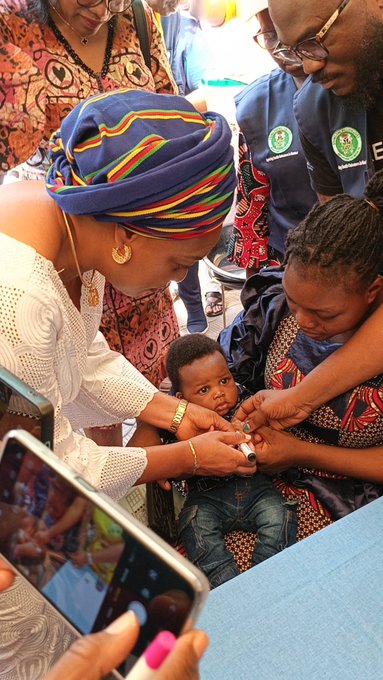
The Lagos State Government, through the Lagos State Primary Health Care Board, has launched the 2025 Polio Outbreak Response Campaign, reaffirming its commitment to eradicating polio and safeguarding the health of its children.
The ceremony, held at the Simpson Primary Healthcare Centre, was led by the First Lady of Lagos State, Dr. (Mrs.) Claudiana Ibijoke Sanwo-Olu, represented by Mrs. Widad Jumoke Mustafa, a member of the Committee of Wives of Lagos State Officials (COWLSO).
In her address, the First Lady emphasised the state government’s proactive measures to keep Lagos polio-free, highlighting the critical importance of the campaign in preventing the debilitating effects of poliomyelitis, which can result in paralysis or death.
READ ALSO: IMPEACHMENT: Lagos Ex-Speaker, Obasa’s ‘Sins’ Revealed
The First Lady also called on parents, community leaders, and stakeholders to support the campaign by ensuring eligible children are vaccinated.
Targeting children aged 0-59 months, vaccination teams will administer the Oral Polio Vaccine (OPV) to prevent virus transmission.
Dr. Kemi Ogunyemi, the Special Adviser on Health, expressed gratitude to Lagosians for their continued cooperation in the fight against polio. While appreciating all healthcare workers and partners for their services, Mrs. Ogunyemi encouraged parents to present their children and wards for the exercise.
Also speaking, the Chairman of Lagos Mainland Local Government, Mrs. Omolola Rashidat Essien opined that Immunization is key in ensuring that children are kept safe from polio and other vaccine preventable diseases.
Dr. Abimbola Bowale, the Supervising Permanent Secretary, Lagos State Primary Health Care Board, who also spoke at the event, underscored the life-saving importance of immunization.
“All children aged 0-59 months need multiple doses of the polio vaccine to ensure full protection. Any child missed represents a potential risk for the poliovirus to spread. The vaccine is safe, effective, and crucial in keeping our communities polio-free,” he stated.
Dr. Bowale also outlined several strategies to ensure the success of the campaign, including fixed post teams stationed at primary healthcare centres and public health facilities, house-to-house visits, and a transit strategy to reach special locations such as places of worship, schools, motor parks, and other public venues.
The event concluded with Dr. (Mrs.) Claudiana Ibijoke Sanwo-Olu officially launched the campaign, marking a renewed effort to maintain Lagos State’s polio-free status.

The Lagos state suspected cholera cases have risen to 421.
The Commissioner for Health, Akin Abayomi disclosed this on his Instagram handle @profakinabayomi on Saturday.
“As of June 20, 2024, an additional four suspected cholera cases have been reported, as illustrated in the accompanying graph,” he wrote.
He noted that the Emergency Operations Centre in collaboration with all relevant partners is actively engaged in contact tracing, community-based surveillance, awareness campaigns, sample testing, and ensuring that confirmed cholera cases receive appropriate medical treatment.
READ ALSO: Two Suspects Arrested For Stealing Car From Mosque During Juma’at Prayer
On Friday, the commissioner confirmed 35 cases out of the 417 suspected cases and 24 deaths across 20 Local Government Areas in the state.
The cases were reported from Agege, Badagry, Ikeja, Mushin, Ajeromi-Ifelofun, Epe, Ikorodu, Ojo, Alimosho, and Eti-Osa.
Others were Kosofe, Oshodi-Isolo, Amuwo-Odofin, Ibeju-Lekki, Lagos Island, Shomolu, Apapa, Ifako-Ijaiye, Lagos mainland, and Surulere.
Cholera is a food and water-borne disease caused by ingesting the bacteria— Vibrio cholerae — in contaminated water and food. Cholera can cause severe acute watery diarrhoea, and the severe forms of the disease can kill within hours if left untreated.
In Nigeria, cholera is an endemic and seasonal disease, occurring annually mostly during the rainy season and more frequently in areas with poor sanitation.
READ ALSO: Police Arrest 28yr Old Suspected Cultists, Recover Gun In Delta Community
The World Health Organisation on Thursday announced a spike in cholera in several regions of the world, with almost 195,000 cases and over 1,900 deaths reported in 24 countries since the start of 2024.
WHO said the Eastern Mediterranean Region reported the highest number of cases, followed by the African Region, the Region of the Americas, the Southeast Asia Region, and the European Region.
The global health body, however, noted that there are no reported cases in the Western Region, according to its bulletin released on Wednesday.
It said it exhausted its global stockpile of Oral Cholera Vaccines by March but was able to exceed “the emergency target of five million doses in early June for the first time in 2024.”

By Silver Yeibake
Autism, commonly known as Autism Spectrum Disorder (ASD), is a neurodevelopmental disorder that affects communication, social interaction, and behavior. Autism is referred to as a spectrum condition since it can manifest in a variety of symptoms and abilities. While the actual cause of autism is unknown, evidence suggests that genetic and environmental factors interact to influence its development.
The risk factors include a sibling with autism, advanced age of parents, exposure to certain air pollutants and pesticides before birth, extreme prematurity, mothers with diabetes, immune system disorders or obesity, any difficulty with delivery leading to deprivation of oxygen to the baby’s brain, fever during pregnancy, lack of certain vitamins minerals during pregnancy, and certain genetic conditions, such as Down, fragile X, and Rett syndromes.
“Risk factors can not on their own cause a disease. However, they can increase the likelihood of that disease in a person.”
It is important to know that contrary to trending claims online, there is no scientific or medical evidence that vaccines or consumption of sugar are risk factors for autism.
READ ALSO: Kidney Stones: What You Need To Know
Autism is defined by difficulties in social interaction and communication. Individuals with autism may struggle to grasp social cues, maintain eye contact, and engage in typical back-and-forth conversations. Some people may also engage in meaningless, repetitive actions, such as hand-flapping or rocking, and have strong interests in specific areas.
It is essential to remember that autism is a lifelong diagnosis, but with early intervention and adequate care, people with autism can live fulfilling lives.
Autism treatment frequently includes behavioral therapy, speech therapy, occupational therapy, and social skills training. Each individual with autism is unique, thus interventions should be tailored to meet their personal needs and strengths.
In spite of the difficulties that autism can cause, many people with autism possess unique talents and abilities. Some people may succeed in fields such as music, art, mathematics, or programming, thus it is important for society to acknowledge and honor the qualities and achievements of people with autism.
In summary, autism is a complicated and diverse disorder that affects individuals in various ways. By raising autism knowledge, understanding, and acceptance, we can build a more inclusive society in which people with autism can thrive and attain their full potential.
Dr. Yeibake, Weriwoyingipre Silver.
Senior Registrar,
Faculty Of Pediatrics,
WACP
- NYSC Commends Bauchi Govt On Infrastructural Development In Orientation Camp
- Gunmen Kill 10 In Anambra Community
- EFCC Arrests 31 Suspected Internet Fraudsters In Nasarawa
- 30-year-old Man Hacks Mother To Death
- FCT Police Arrest Three Wanted Kidnappers
- Ghana Deports Convicted Nigerian For Smuggling Fake $100,000
- Man Jailed Seven Years For N11.4m Enugu Land Fraud
- Tragedy As 23-year-old Dies By Self-stabbing In Delta
- Police Raid Criminal Hideouts In Delta, Arrest Suspects, Seize Weapons
- Sex Worker Dies After Dispute Over N15,000 Refund In Ondo
About Us
Trending

 News5 days ago
News5 days agoArson: Man To Pay N150m For Burning FRSC Patrol Vehicle In Bauchi

 Politics4 days ago
Politics4 days agoBREAKING: Confusion As APC Chair, Ganduje Resigns

 News2 days ago
News2 days agoAuchi Poly Mass Comm Class of 2006 Holds Maiden Reunion in Benin

 Politics5 days ago
Politics5 days ago‘Peace Has Returned To Rivers’ — Wike, Fubara Speak After Meeting Tinubu

 Headline2 days ago
Headline2 days ago‘They Checked My Instagram’ – Nigerian Lady Breaks Down After Landing In U.S, Denied Entry

 Metro2 days ago
Metro2 days agoBREAKING: Emir’s Palace, NDLEA Office Set Ablaze As Protest Rocks Kwara

 Sports4 days ago
Sports4 days agoChelsea Set To Offload Jackson, Madueke, 8 Others [See list]

 News3 days ago
News3 days agoNSCDC, Immigration, Others: FG Postpones Recruitment, Changes Portal

 Metro4 days ago
Metro4 days agoNAPTIP Declares Speed Darlington Wanted For Tape, Cyberbullying

 Metro1 day ago
Metro1 day agoPanic As Bees Invade Central Mosque In Edo


